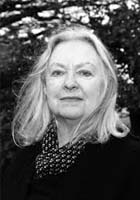Gillian Clarke Poems
Under the ocean where water falls
over the decks and tilted walls
where the sea come knocking at the great ship's door,
...
When all's said, and done,
if civilisation drowns
the last colour to go
...
You scan the stream, silver-eyed as a heron
searching the surface for what might betray
a halt in the flow, pentameter's delay,
a master's faded words, his lexicon.
...
Snowlight and sunlight, the lake glacial.
Too bright to open my eyes
in the dazzle and doze
of a distant January afternoon.
...
28 June 1960
Perhaps a woman hanging out the wash
paused, hearing something, a sudden hush,
...
An old ewe that somehow till this year
had given the ram the slip. We thought her barren.
Good Friday, and the Irish peace deal close,
and tonight she's serious, restless and hoofing the straw.
We put off the quiet supper and bottle of wine
we'd planned, to celebrate if the news is good.
Her waters broke an hour ago and she's sipped
her own lost salty ocean from the ground.
While they slog it out in Belfast, eight decades
since Easter 1916, exhausted, tamed by pain,
she licks my fingers with a burning tongue,
lies down again. Two hooves and a muzzle.
But the lamb won't come. You phone for help
and step into the lane to watch for car lights.
This is when the whitecoats come to the women,
well meaning, knowing best, with their needles and forceps.
So I ease my fingers in, take the slippery head
in my right hand, two hooves in my left.
We strain together, harder than we dared.
I feel a creak in the limbs and pull till he comes
in a syrupy flood. She drinks him, famished, and you find us
peaceful, at a cradling that might have been a death.
Then the second lamb slips through her opened door,
the stone rolled away.
...
I am sitting in the wrong room listening
For the wrong baby. I don't love
This baby. She is sleeping a snuffly
Roseate, bubbling sleep; she is fair;
She is a perfectly acceptable child.
I am afraid of her. If she wakes
She will hate me. She will shout
Her hot midnight rage, her nose
Will stream disgustingly and the perfume
Of her breath will fail to enchant me.
To her I will represent absolute
Abandonment. For her it will be worse
Than for the lover cold in lonely
Sheets; worse than for the woman who waits
A moment to collect her dignity
Beside the bleached bone in the terminal ward.
As she rises sobbing from the monstrous land
Stretching for milk-familiar comforting,
She will find me and between us two
It will not come. It will not come.
...
I can remember you, child,
As I stood in a hot, white
Room at the window watching
The people and cars taking
Turn at the traffic lights.
I can remember you, our first
Fierce confrontation, the tight
Red rope of love which we both
Fought over. It was a square
Environmental blank, disinfected
Of paintings or toys. I wrote
All over the walls with my
Words, coloured the clean squares
With the wild, tender circles
Of our struggle to become
Separate. We want, we shouted,
To be two, to be ourselves.
Neither won nor lost the struggle
In the glass tank clouded with feelings
Which changed us both. Still I am fighting
You off, as you stand there
With your straight, strong, long
Brown hair and your rosy,
Defiant glare, bringing up
From the heart's pool that old rope,
Tightening about my life,
Trailing love and conflict,
As you ask may you skate
In the dark, for one more hour.
...
We once watched a crowd
pull a drowned child from the lake.
Blue lipped and dressed in water's long green silk
she lay for dead.
Then kneeling on the earth,
a heroine, her red head bowed,
her wartime cotton frock soaked,
my mother gave a stranger's child her breath.
The crowd stood silent,
drawn by the dread of it.
The child breathed, bleating
and rosy in my mother's hands.
My father took her home to a poor house
and watched her thrashed for almost drowning.
Was I there?
Or is that troubled surface something else
shadowy under the dipped fingers of willows
where satiny mud blooms in cloudiness
after the treading, heavy webs of swans
as their wings beat and whistle on the air?
All lost things lie under closing water
in that lake with the poor man's daughter.
...
For the green turtle with her pulsing burden,
in search of the breeding ground.
For her eggs laid in their nest of sickness.
For the cormorant in his funeral silk,
the veil of iridescence on the sand,
the shadow on the sea.
For the ocean's lap with its mortal stain.
For Ahmed at the closed border.
For the soldier with his uniform of fire.
For the gunsmith and the armourer,
the boy fusilier who joined for the company,
the farmer's sons, in it for the music.
For the hook-beaked turtles,
the dugong and the dolphin,
the whale struck dumb by the missile's thunder.
For the tern, the gull and the restless wader,
the long migrations and the slow dying,
the veiled sun and the stink of anger.
For the burnt earth and the sun put out,
the scalded ocean and the blazing well.
For vengeance, and the ashes of language.
...
